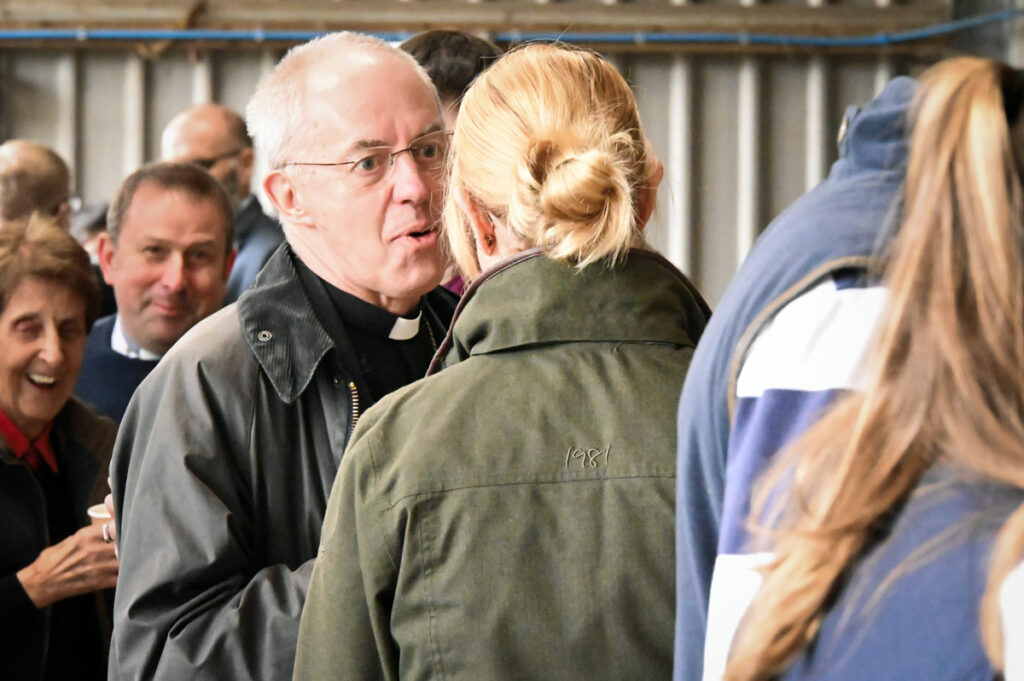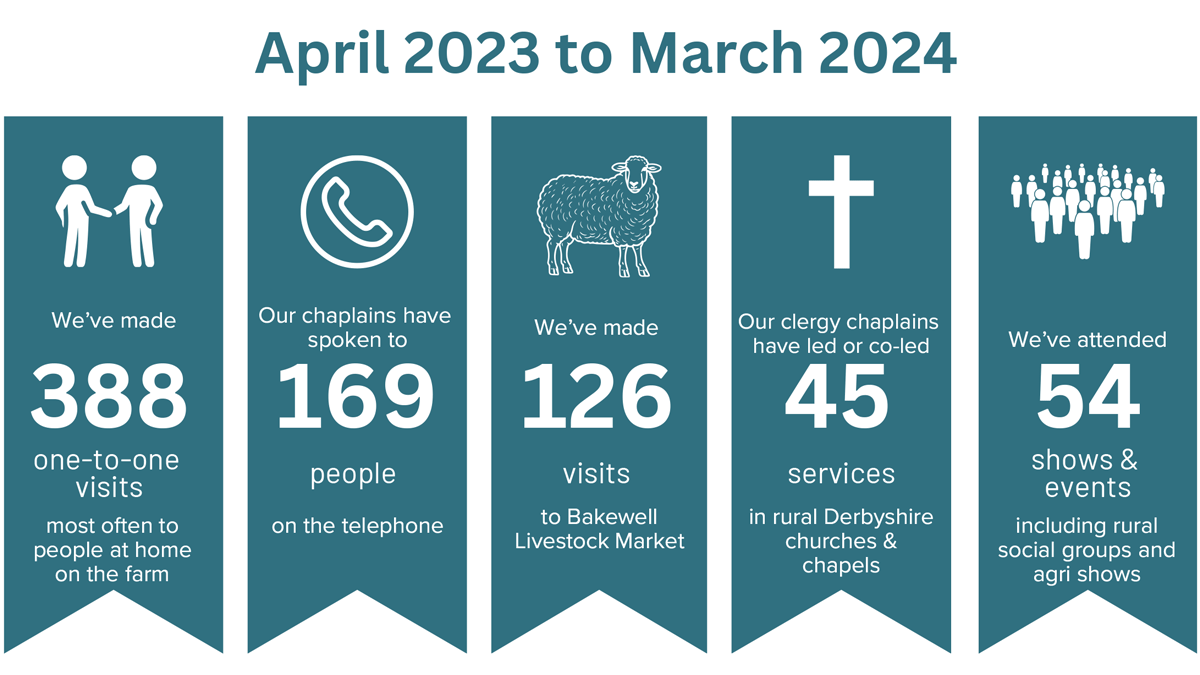Approachable, seen, known, and available
Approachable, seen, known, and available
Graduating with an MA this December is Alan Griggs, lead agricultural chaplain in the Diocese of Derby. He combined research on Jewish-Christian dialogue with his daily pioneering presence in the countryside.
by Helen Harwood,
Helen: Alan, I talked to you last year about “starting life with a wobbly wheel”. This time I’d like to ask you more about your studies.
I understand your dissertation topic was Jewish–Christian dialogue. I know this is an area close to your heart and maybe you could explain why?
Alan: I am interested in the view of some New Testament scholars such as Pamela Eisenbaum, who suggest the earliest Jewish followers of Jesus, including the Apostle Paul, remained firmly within Judaism.
It is only today that we face the reality of a separation between Judaism and Christianity often coined as the ‘Parting of the Ways’. As someone with Jewish heritage, I live out my faith in the midst of a tension between these two (far more complex) worlds.
The dissertation explores readings of Galatians 3:28, “There is no longer Jew or Greek,” a verse that is central to the churches vision of ‘unity in diversity’ and described by one writer as a kind of Magna Carta for humanity.
However, particular readings can leave Jewish people asking if Galatians 3:28 is a positive vision for them in light of a history of Christian anti-Judaism that has proved otherwise.

Therefore, the dissertation seeks to explore the mixed legacy of the universal vision of Gal 3:28, that I think, is so much more than a Christian vision.
In other words, for the Jewish Paul within Judaism, it is the God of Israel’s expansive vision for all humanity that began in God’s covenant with Abraham and includes both Jews and Gentiles who relate to God as Jews and Gentiles.
Helen: How has the MA been for you? I understand that it has opened up the opportunity to engage with issues that are extremely important to you. Can you tell us more?
Alan: Following my initial encounter to follow Jesus the Messiah – on a Kibbutz in Israel in 1994, after a long period of navigating the cultures of church, I eventually found a home in the Church of England and began training for ordination in 2012.
Since my ordination in 2015, I have served in Derby Diocese as an interim minister in five rural parishes and as the lead agricultural chaplain in Derbyshire.
In my experience, Jewish–Christian relations, and the history of Christian anti-Judaism, has been notable by its absence in theological training, training for curates, and ongoing ministerial training. In response to this gap, I connect with Jewish–Christian relations as a member of the Council of Christians and Jews (CCJ).
The MA has offered a wonderful opportunity to take some time to dig deeper into the complex debates surrounding the formation of early Christian identity, and how the Jesus movement related to first century Judaisms.
My hope is that the dissertation will stimulate opportunities for Jewish–Christian dialogue in Derby Diocese and ‘make Christianness strange’ as a way of reading Scripture.
In other words, Scripture has often been read through a dominant Christian lens that reconstructs Paul according to our own theological image.
I argue that we need to hear Jewish voices that have been pushed to the margins to help enrich our readings of Scripture.
Helen: Last time, you told us that the MA has helped you to develop study as a spiritual discipline and ‘slow down’. How does this slowing down feed into your spiritual life, how does it nourish you? And when (if ever) do you need to ‘speed up’?
Alan: I have no problem speeding up and living in a spiritual fast lane as ministry always seems to demand more and more of our time and energy.
So, despite the MA clearly adding to the workload, the discipline of carving out space to get the study done has been a great way of changing gear and moving into a slower lane and reflecting on ministry.
In the process of study and ‘slowing down’ I have learnt more about myself, mission and ministry in my context, and ultimately more about Jesus in the world.

Helen: I know that the CMS MA has clarified and encouraged your calling in the Derbyshire Rural Chaplaincy, and has done this through deeper study and reflection. Can you tell us more – any ‘light bulb’ moments?
Alan: A light bulb moment has been the simple affirmation that the work of the Derbyshire Rural Chaplaincy is a pioneering mission and ministry – where our missional significance comes from simply being approachable, seen, known, and available, as we build long term relationships with a community deeply rooted to place.
A key lesson has also been to embrace our ‘smallness’ and celebrate our unique calling in the mixed ecology of church.
As one of our chaplains recently put it, “Our starting point is to travel with people where they are, not where we are.”
Helen: Can you tell us more about the things you run, the services, the presence at agricultural shows?
Alan: It is difficult to capture everything that we do. Perhaps a visit to our website or a flick through our recent annual review will provide a bit more detail.
We do have some new events in the pipeline to help us connect with our farmers this year, including a farm walk.
We always look forward to our annual carol service in the farmers’ market that attracts around 500 people every year.
And we regularly complement their mission and ministry of the rural church, taking weddings and funerals and other services of worship across Derbyshire.
Helen: I am delighted to hear that Archbishop Justin Welby made a recent visit to a farm to recognise your pioneer ministry with the farming community, and to hear from farmers. Can you tell us how that went?
Alan: As part of his visit to Derby Diocese in April 2024, the Derbyshire Rural Chaplaincy hosted Archbishop Justin on a local farm to hear about the challenges facing farmers and hear about the difference we are making for the farming community in Derbyshire.
The archbishop listened carefully and offered prayers that reflected his empathy for all that our farmers do under difficult circumstances, and in the face of significant change in the sector.
Helen: Lastly, Alan, how can we pray for you?
Alan:
- Please pray that the mission and ministry of the DRC team will continue to grow in reach and depth.
- Pray for opportunities to travel with people where they are.
- For ongoing opportunities to support the mission and ministry of the rural church in Derbyshire
- For our monthly short service in the market to be a place of blessing and rest for some of our busy farming community
- For our upcoming events with farmers